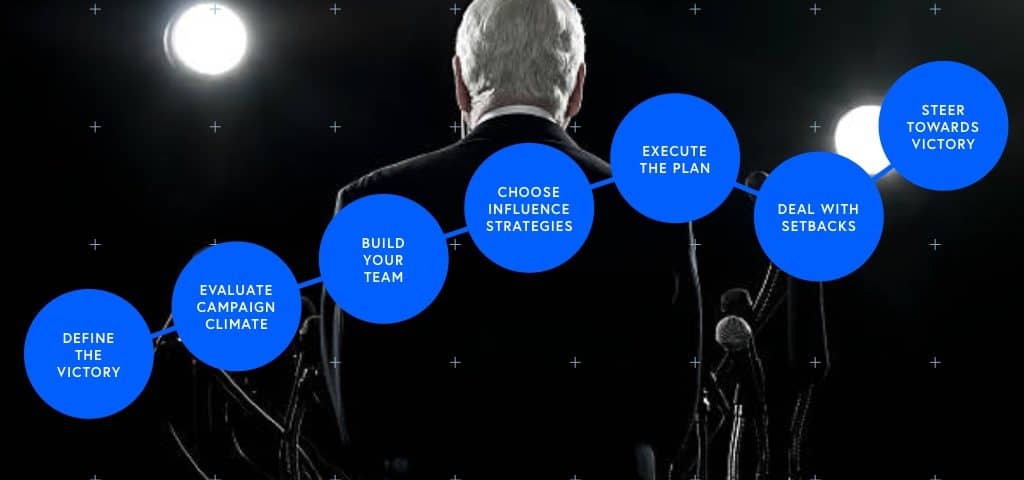The 2018 midterm elections are around the corner, and campaign news from both sides of the aisle are beginning to flood the media. Watching both parties work to earn voter confidence, manage information and control the issues, it occurred to me that running a political campaign designed to win an election is a lot like running an enterprise sales cycle designed to close a deal.
In both cases, a team must navigate a highly complex environment to achieve a specific goal: win an election or close a deal.
For political campaigns, there is a general system that both parties follow, with variations based on timing, office, and candidate. The process for closing enterprise sales tends to be less structured. And most enterprise sales leaders don’t assign the right teams, allocate adequate resources, or plan the process from start to finish.
So that’s what this post will address: how political campaign tactics can help enterprise sales teams close more deals.
Setting the stage
After two decades in enterprise sales, I’ve found the phases of the modern political campaign align with the tactics used to close our biggest deals:
- Define the Victory
- Evaluate the Campaign Climate
- Build Your Team
- Choose Your Influence Strategies
- Execute the Plan
- Deal with the Competition and Setbacks
- Steer Towards Victory
But before you start, you’ve got to know what you stand for. Who are you in relation to the customers you’re going after? People will only vote for (or buy) what you’re selling if it meets their needs and they see that you believe in its value.
Zack Etra, an Enterprise Account Executive at AlphaSense, has deep experience weaving through the hierarchy of complex corporate environments to close enterprise business. In one example, he and his team spent hundreds of hours forging a relationship with a Fortune 500 industrials company to eventually win their enterprise-wide business:
“We developed custom collateral that tied our brand to the client’s culture. This organization established a very specific operating system (their bylaws); we worked to become one with their principles.”
The sale was more than a transaction. Zack, his team, and their prospect were in it together.
Now, let’s look at each stage of the campaign process as it relates to enterprise sales.
“A successful campaign requires a dedicated and knowledgeable candidate. It requires careful research into voter trends and voter groups. It requires an effective message and delivery of that message. It also requires money, personnel, and people-management skills.”
– Mike McCurry, Press Secretary to President Bill Clinton
Define the victory
Political campaigns are binary: the candidate wins or loses. Enterprise Sales can be more nuanced, with varying levels of success, but it’s still important to define what a victory is for your team.
Political campaigns have limited time and resources, so they need to identify worthwhile opportunities. And so do you. Start by asking questions that remove weak prospects or fatal flaws in the deal.
What are you selling? What vertical are you selling to, and which companies / functional areas within that company, can benefit the most? Are they in a good place to consider buying your product? You’ll find a small (perhaps even very small) group of prospects are worth going after.
The victory then is not just closing a deal but closing a specific deal with a specific company, which takes us to step two.
Evaluate the campaign climate
Let’s call this the research phase. Here campaign teams learn everything about their target groups – their problems, motivations, and desires.
The seller, having defined a prospect, does the same. Assess their target vertical market, identify key decision makers within the organization, scout the competition and learn how various groups and departments function.
As expert Enterprise seller Zack Etra says, “We studied the organization that we sought to influence. We learned about the markets they played-in, the firm’s strengths, weaknesses, opportunities, and threats.”
Before you can forge a path to victory, you need to know what you’ll face along the way.
Build your team
Political campaigns cannot be won by an individual. Neither can an enterprise sale.
Inexperienced sales management may assign one person (“account owner”) the task of running / closing the enterprise sale. While good in theory because there is only one person to take the blame, this almost never works. Not because that person isn’t talented, but because the scope of the project is just too large. This image from Gartner illustrates just how arduous the journey is:
The sales team brought together to win in the enterprise must be a hyper-coordinated unit, starting with the lead seller (“campaign manager”) and several support functions working alongside the seller: SDR, Customer Success, Sales Manager. But it also needs to draw on people deeper in the organization based on the requirements of a given situation. Knowing when to call on sales enablement for workshopping the deal, product specialists to dive even deeper with the prospect, head of product to share the product roadmap, product marketing for customized material, the CRO, or even CEO is crucial. Everyone in your organization can be a contributor to the sale.
Choose your influence strategies
For political campaigns, this means grassroots organizing to build broad advocacy while targeting special interest groups and influential individuals. A ‘campaign trail’ must be mapped with a strategy for the specific issues covered in each place.
Have a detailed plan. . What is the sequence of meetings, presentations, and conversations your enterprise sale should follow? You can’t ask for votes or send an contract without introducing your product, clarifying points, and building a case for adoption.
Grassroots organization is also essential. Fortune 500s are vast and often have departments and groups that disagree about your product. A single “no” vote from a key stakeholder in the prospect organization can lose a sale, so developing broad advocacy and individual champions key.
Execute the plan
For political campaigns, this means working the campaign trail and infusing every speech, panel, and conversation with relevant and compelling stories, value and authenticity. There is an element of storytelling and performance involved that also applies to enterprise sales.
Several teams could be going after the same prospect and present similar material to the same people. In this case, it’s the feeling, tone, and enthusiasm that makes the difference.
This process can be a lot less daunting, by the way, if you choreograph the sale down to the smallest interaction. You’ll find this keeps you focused and allows for creative spontaneity.
Deal with competition and setbacks
In an enterprise sales cycle, you’ll face both external competitors and internal detractors within your prospect’s organization. Combat these issues the same way you built your influence.
Plan for challenges, because they will arise. For example,
- A difficult stakeholder may be vocal in his or her resistance to your solution. You’ll need proofs ready to combat these objections or doubts.
- a competing firm may cause problems. Be ready to show why your solution is the better choice.
- You or someone on your team may make a mistake.
What is your strategy for rolling with mistakes (spin control) at each stage of the process? Stay focused and don’t compromise on your position. Instead, act like a political candidate after a smear campaign: adjust tactics but remain focused on the victory.
John Podhoretz, political author and speechwriter for former presidents Ronald Reagan and George H.W. Bush said:
“Every great political campaign rewrites the rules; devising a new way to win is what gives campaigns a comparative advantage against their foes.”
Steer toward victory
Political campaign teams collect data, assess performance and poll voters. Then they adjust their strategy and make sure the data and the general sentiment are in line with their goal.
An enterprise sale requires the same thoroughness. In the enterprise sales cycle, there is real risk for stagnation if the sales team lacks a precise strategy for success.
Enterprise sales are long-term efforts that generally last 6-12 months.
Here’s Zack Etra discussing the tenacity required during a lengthy sale: “We demonstrated grit and intensity but balanced our approach with curiosity and empathy. We showcased our passion and generated awareness through every communication medium within reach – but always kept sight of our underlying goal: provide immense value back to our customer!”
Fulfilling the promise
At the end of the election or the close of a sale, voters and stakeholders give their go or no-go decision. Then the race is over. The sales cycle finished. But did you achieve the victory you planned for?
There are so many factors involved in both political campaigns and enterprise sales that it’s hard to know what tipped the scale. And that’s the point. In running your enterprise sale like a political campaign, you are playing to win. Of course, if you do close the deal, then the real test begins. It’s time to deliver.
AlphaSense is growing globally. See open roles at AlphaSense here.




